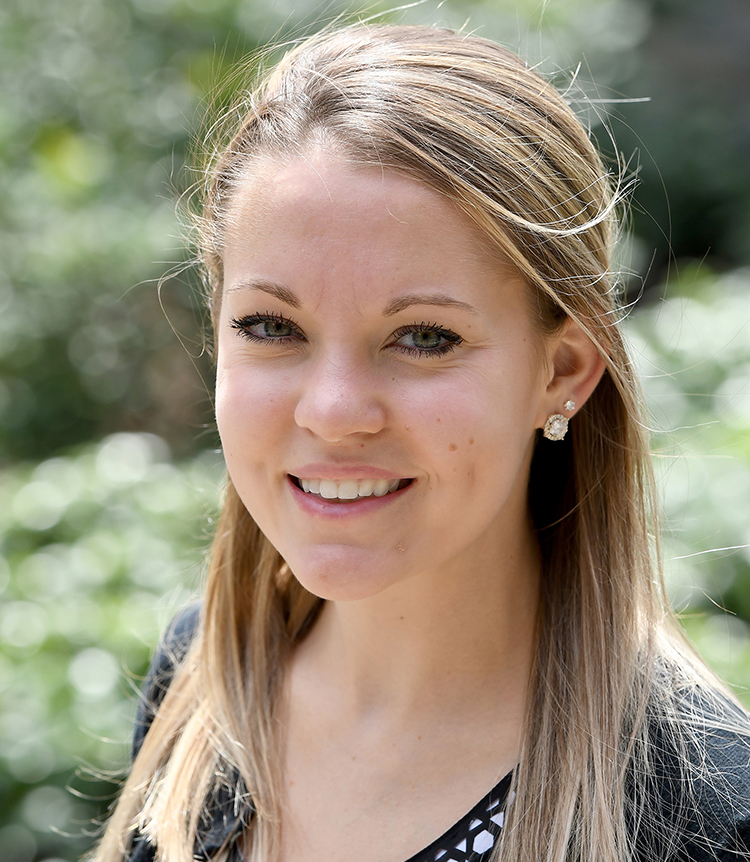Erika Squires
Research Focus
My research interests focus on linguistic changes that accompany normal aging, dementia, and aphasia. I am interested in conducting research to better understand factors that facilitate or inhibit access to health care for individuals with communication disorders. I plan to use research to create educational programs for health care providers and older adults with the ultimate goal of improving the quality of health care delivered to older adults.
Education
Ph.D. Candidate, Communication Sciences and Disorders, Wayne State University (2017 - current)
M.A., Speech-Language Pathology, University of Toledo (2016)
B.A.A., Communication Disorders, Central Michigan University (2014)
Research Project Title
Master's Thesis: Education and Advocacy for Individuals with Hearing LossCertifications
ASHA Certificate in Clinical Competence
Licensed Speech-Language Pathologist - State of Michigan
Basic Life Support (BLS) Certified
Courses Taught
Fluency Disorders. (G) CSD 554. Eastern Michigan University. Fall 2020.
Normal Language Acquisition and Usage. (UG) SLP 5320. Wayne State University. Spring/Summer 2020.
Normal Language Acquisition and Usage. (UG) SLP 5320. Wayne State University. Spring/Summer 2019.
Normal Language Acquisition and Usage. (UG) SLP 5320. Wayne State University. Spring/Summer 2018.
Presentations
Squires, E.S, & Greenwald, M. (2018, March). Communicative Strategy Use and Perceptions in Persons with Aphasia. Poster session presented at the annual meeting of the Michigan Speech, Language, & Hearing Association, Kalamazoo, Michigan.
Pakulski, L.A., Squires, E.S., & Bok, M. (2016, November). Pre-Service Healthcare Professionals’ Knowledge of Hearing Loss: Online Training to Improve Healthcare Communication with Patients. Poster session presented at the annual meeting of the American Speech, Language, & Hearing Association, Philadelphia, Pennsylvania.
Squires, E.S. & Pakulski, L.A. (2016, April). Knowledge of Hearing Loss Among Students Pursuing Careers in Health Care. Poster session presented at the annual meeting of the Michigan Speech, Language, & Hearing Association, Grand Rapids, Michigan.
Squires, E.S. & Pakulski, L.A., (2015, November). Effects of Classroom Noise on Student Learning and General Well-Being. Poster session presented at the annual meeting of the American Speech, Language, & Hearing Association, Denver, Colorado.
Honors and Awards
Wayne State University Graduate Student Assistant 2017 - Current
Institute of Gerontology, Wayne State University, Predoctoral Training Fellowship 2018 - Current
ASHFoundation Graduate Student Scholarship, 2019
Student Research Travel Award, American Speech Language Hearing Association, 2018
Graduate Studies Consortium for Listening and Spoken Language Scholar, University of Toledo, 2014-2016
Best Student Poster Award, Michigan Speech Language Hearing Association, May 2016
Publications
Ou, H. & Squires, E. S. (submitted). Development of the Rapid Estimate of Adult Literacy in Audiology (REALA). Journal of Health Communication.
Ou, H. & Squires, E. S. (2020). Patient education materials for age-related hearing loss: Issues and Solutions. The Hearing Journal, 73(4), 26-27.
Squires, E. S., & Ou, H. (2020). Do We Have Effective Patient Education Materials for Age-Related Hearing Loss? American Journal of Audiology, 20(1), 79-87.
Pakulski, L. A., McCormick, M., Robbins, T., Glassman, J., & Squires, E. S. (2019). Understanding and addressing the impact of hearing acuity on healthcare and healthcare communication. Journal of Interprofessional Education & Practice, 15, 138-141.
Squires, E.S, Pakulski, L.A., Glassman, J., & Diehm, E. (2019). Knowledge of hearing loss among university students pursuing careers in health care. Journal of the American Academy of Audiology, 30(4).
Squires, E.S, Pakulski, L.A., Diehm, E., & Glassman, J. (2017). Measuring classroom acoustics. eHearsay, (7)1, 4-13.
Pakulski, L.A., Anderson, K., Squires, E.S., & Glassman, J. (2016). Noise pollution (noise-scape) among school children, Journal of Educational, Pediatric & (Re)Habilitative Audiology, (22).
